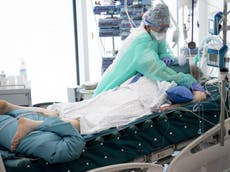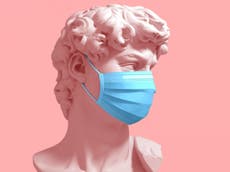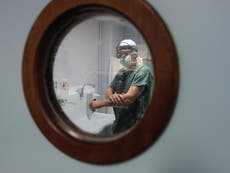Coronavirus: 25,000 beds needed for Covid-19 patients for months to come, secret NHS report reveals
Exclusive: ‘It is hard to see how this demand can continue to be met without either substantial extra workforce or compromises in the quality or safety of care’
The NHS forecasts that hospitals will need tens of thousands of beds for coronavirus patients as late as July – and possibly beyond – according to a confidential analysis shared with The Independent.
The secret report marked confidential and not for sharing is titled “Modelling of Covid-19 impact on the NHS” and is based on “assumptions” by the government’s Scientific Advisory Group for Emergencies, or Sage, which advises ministers on their response to the outbreak.
According to the document, the “overall bed capacity required for Covid-19” by 20 July will still be 24,630 hospital beds.
This raises questions about how likely it is the health service will be able to get back to anything close to resembling its normal operations before autumn, and suggests the lockdown may have to continue for longer in order to “shield” the health service from the effects of coronavirus.
The analysis, dated 7 April, is based on yet-to-be published modelling carried out by Imperial College London, which includes considering the effects of the lockdown and whether there is good compliance or bad compliance with the rules.
The report shows the NHS in England will need more than 4,439 critical care beds by 20 July in order to be ready for the number of patients forecast if lockdown does not reduce cases significantly. These would be for patients needing to be sedated and ventilated with a machine to help them breathe.
This is down from a peak of 6,152 in the week starting 4 May – an indication that the peak of hospital admissions may have been pushed back by the government’s lockdown measures.
In addition, analysis shows England will need, at the peak of cases, more than 3,300 beds for patients requiring non-invasive ventilation such as continuous positive airway pressure, or CPAP – a mask over the face to help them breathe.
Hospitals will also need more than 23,600 beds for patients to receive basic oxygen support, according to the report.
The document said it assumed the “proportion of infected people who would normally require hospitalisation [at] 4.4 per cent”.
It also revealed patients are being hospitalised sooner than first thought, down from 13 days to nine on average. Patients who were ventilated were staying in hospital for around 15 days.
The report also suggested a shift from patients needing ventilation to non-invasive breathing support “due to emerging evidence on the better than expected effectiveness of some non-mechanical ventilation techniques”.
But the report admits it has not considered any seasonal effect on the spread of the virus, or extra measures to increase NHS capacity or “staff shortages that may arise”.
A senior source who shared the modelling with The Independent said: “This focuses on NHS utilisation in terms of beds, it doesn’t talk about staff – and the number of staff needed to look after that many patients.
“At the moment everyone is running on adrenaline – but we will need to take annual leave or people will burn out.”
These concerns were echoed by Alison Leary, professor of workforce modelling from London’s South Bank University.
Asked for her view on the NHS England report, she said: “These models show long and sustained demand.
“We are beginning to understand the extra demand being placed on the workforce, in addition to existing need that is not being met in areas such as cancer and long-term conditions.
“It is hard to see how this demand can continue to be met without either substantial extra workforce or compromises in the quality or safety of care.”
An NHS England spokesperson said: “The NHS previously identified that freed-up hospital capacity would initially need to be available until at least July to look after sizeable numbers of coronavirus patients, with a review of capacity needed thereafter, and that remains the position.
“Once it is clear that Covid-19 hospital bed occupancy has peaked, the NHS will be able to redeploy any resulting spare capacity. In the meantime, the single most important measure anyone can take to avoid coronavirus admissions and to save lives is to follow the expert medical advice to reduce new infections.”
Subscribe to Independent Premium to bookmark this article
Want to bookmark your favourite articles and stories to read or reference later? Start your Independent Premium subscription today.







Join our commenting forum
Join thought-provoking conversations, follow other Independent readers and see their replies
Comments